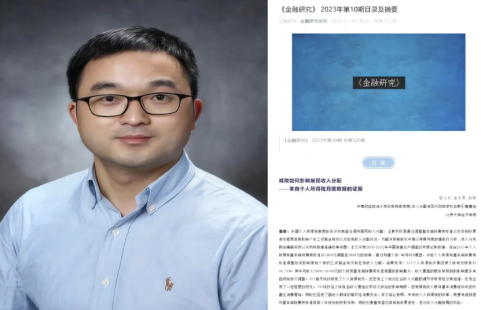
[Academic Journal] Journal of Financial Research, Issue 10, 2023.
[About the Author] Lu Yuanping is the professor and doctoral supervisor at the School of Public Finance and Taxation, Zhongnan University of Economics and Law (ZUEL), Vice Minister of Scientific Research Department, Young Scholar of the "Wenlan Scholar Program", and the Candidate of the Hubei Provincial Key Talent Project. He also serves as the Executive Director of the Innovation and Talent Base for Income Distribution and Public Finance of the Ministry of Education and the Ministry of Science and Technology of China. His research fields include income distribution and common prosperity, social security and fiscal policy, inter-generational mobility, happiness economics, etc. He has led more than 20 national, provincial and ministerial projects such as the General Program of National Natural Science Foundation of China, Youth Program of National Natural Science Foundation of China, Humanities and Social Sciences Fund Project of the Ministry of Education, and Ministerial-Provincial Cooperation Project of the Ministry of Finance. He has published more than 40 papers in SSCI/CSSCI. His research results have been published in Chinese and English journals such as Economic Research Journal, China Economic Quarterly, Journal of Financial Research, Finance & Trade Economics, Economic Perspectives, Journal of Happiness Studies, China & World Economy, and The Social Science Journal.
[Main Views] China's individual income tax system is designed to regulate the distribution of residents' income by adjusting the basic expense deduction standard to change the degree of tax progressiveness, thus affecting the tax burden on individuals' salaries and wages as well as macro-income distribution. To solve the problems in existing researches such as difficulty in using monthly data for analysis, deviation of income distribution assumptions from reality and accuracy of taxation data, this paper uses monthly bookkeeping data from China's Urban Household Survey (UHS) for the period from 2010 to 2012, and the 2011 policy that increased the basic personal income tax deduction from RMB 2,000 to RMB 3,500, and constructs an individual-year-month difference-in-differences (DID) model to assess how the adjustment of deduction affects both the tax burden on individuals' salaries and wages at the micro level and the macro-level income distribution. Research Findings: (1) The reform of individual income tax has reduced individuals' tax burden by about 36.31%, in which individuals with a monthly income of RMB from 2,000 to 16,100 are affected most by the adjustment of the basic expense deduction standard, and groups with higher incomes are affected more by the adjustment of tax grades; (2) Although the tax reform has reduced the burden of individual income tax, the adjustment effect of individual income tax on social income distribution has not been strengthened but has been weakened to a certain extent; (3) The increase of individual after-tax income after tax reform has a limited impact on labor supply, but it increases the improved consumption in the basic consumption structure of low-income groups and also promotes the service consumption expenditure of high-income groups. The conclusion of this paper shows that the future reform of individual income tax should not only take into account the positive effect of improving the basic expense deduction standard and reducing individual tax burden, but also pay attention to the potential risk of reducing tax progressiveness and worsening income distribution patterns.
